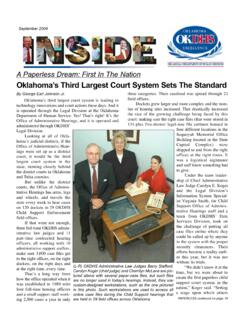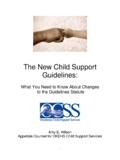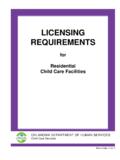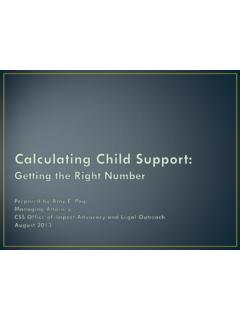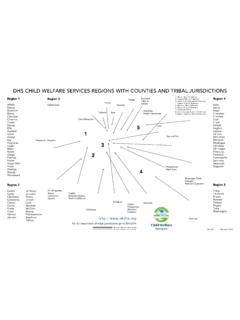Transcription of Interstate Compact on the Placement of Children - okdhs.org
1 OTHERWISE KNOWN AS "ON THE ROAD AGAIN" Interstate Compact ON THE Placement OF Children by Office of General Counsel Oklahoma Department of Human Services July 2007 I. WHAT IS THE ICPC? The ICPC is a Compact or an agreement among all the states, the District of Columbia and the U. S. Virgin Islands which regulates the movement or Placement of Children from one state to another. The Compact , which has been adopted by all states, specifically defines: (a) the types of placements and placers subject to its terms; (b) the procedures to be followed in making an Interstate Placement ; and (c) the protections, services, and requirements afforded by the adoption of the law. The language of the ICPC is exactly the same in each of the states which has adopted it. This assures that the provisions in one state are identical to every other state. Hence, the ICPC is a contract between the participating states which sets forth the procedures for the Interstate Placement of Children and establishes the responsibilities for those placing and receiving the child.
2 II. WHY IS IT NECESSARY TO HAVE THE ICPC? A state's legal jurisdiction ends at its borders. Accordingly, without the ICPC, if a child who is the subject of a deprived action in Oklahoma is placed with an aunt in 2 Texas, the Oklahoma court would have no legal way to determine the suitability of the Placement , monitor the Placement , order services or to enforce any orders it may make with regard to the child. Without the ICPC. the state into which the child is sent would have no legal obligation to provide services or other assistance related to the Placement of the child. The ICPC addresses these problems by: Ensuring the jurisdiction over the child is not lost when he/she moves to the receiving state. Having the prospective receiving state conduct homestudies and evaluations of the proposed Placement in its state before the Placement is made. Allowing the prospective receiving state to make sure that its laws and policies have been followed and to determine if the Placement is "contrary to the interests of the child before approving the Placement .
3 " Establishing that the sending agency or individual continues to be legally and financially responsible for the child. Maintaining necessary services and supervision even though the child is not in the state where the deprived action is pending. Providing the sending agency the opportunity to remain informed and to receive reports as to any issues relating to the Placement . It is taken for granted that all of these safety measures are available when the child remains in the state where the deprived action is pending. However. without the ICPC. when a child is placed in another state these safeguards would not be available. It is only because of the ICPC that these safety measures are available and legally enforceable. III. HOW DO YOU KNOW IF YOU HAVE AN ICPC Placement ISSUE? , A., TYPES OF PLACEMENTS COVERED General Rule: When a child is sent to another state for some sort of out of home living arrangement, you should always consider whether the ICPC applies.
4 Parents: "Placements,,1 with parents when a parent or relative is not making the Placement . Accordingly, EVEN IF THE court OR THE DEPARTMENT IS CONSIDERING " Placement ' WITH A PARENT IN ANOTHER STATE, THE ICPC APPLIES AND SHOULD BE FOLLOWED! If 24 hour care is provided by the child's parent(s) by reason of a court -ordered Placement (and not by virtue of the parent-child relationship) the care is considered to be foster care and subject to the ICPC. Foster Care: Placements into foster care, including foster homes, group homes, and residential treatment facilities and mental institutions for treatment of chronic or long-term conditions. Relatives: Placements with relatives when a parent or relative is not making the Placement . URelative" is defined in the ICPC as a "parent, step-parent, grandparent, adult brother or sister, adult aunt or uncle." Adoption: Placements preliminary to an adoption. 1 Placement : The arrangement for the care of a child in the home of a relative or unrelated individual whether or not the Placement provider receives compensation for the care of the child.
5 Placement 3 Delinquents: Placements of adjudicated delinquents in institutions in other states. B. TYPES OF PLACEMENTS NOT COVERED Hospitals/Medical Facilities: Hospitals or medical facilities which are providing treatment and care for physical conditions. Treatment of Acute Emotional. Psychiatric, and Behavioral Conditions: Placements made in hospitals, medical facilities, residential, and mental health facilities for the acutely ill, short term treatment. Admission to a facility for treatment of an acute mental or behavioral condition requiring stabilization of such condition by short-term treatment is exempt from the ICPC. Education Facilities: Placements made in institutions that are primarily educational in character. Transfer of Custody to Non-Custodial Parent: Whenever the court transfers custody to a non-custodial parent with respect to whom the court does not have evidence that such parent is unfit, does not seek such evidence, and does not retain jurisdiction over the child after the court transfers custody.
6 Relative to Relative: Placements of a child made by a relative (parent, step-parent, grandparent, adult brother or sister, aunt or uncle) or the child's non-agency guardian, IF, AND ONLY IF one of these close relatives is placing the child with another close relative and provided the person's full legal right to plan for the child has been established by law prior to initiation of the Placement arrangement and whose legal rights have not been voluntarily terminated, diminished, or severed by includes the arrangement by the sending agency for the care of a child in the home of his parent, other 4 the action or order of any court . It is important to note that the "close relatives" exception requires that the "close relative" must be on both sides of the transaction in order to remove the applicability of the ICPC. These are placements made outside of DHS and generally do not involve the Department. Visits: Visits to another state are not subject to the ICPC. A visit is considered to be a stay of 30 days or less with a definite arrival and departure date.
7 A stay of more than 30 days can be considered as a visit if it begins and ends in the period of a child's vacation from school, , summer vacation. A "visit" may not be extended beyond the 30 days or school vacation period. If it is extended, it becomes a " Placement " subject to the ICPC. Visits are not to be used to circumvent the use of the ICPC. IV. HOW DO YOU MAKE AN ICPC REQUEST? See policy: GAC 340-75-1-86 ITS No. 1-10 Contact Foster Care Placements: Melanie Slatter Deputy Compact Administrator (405) 522-0672 Department of Human Services lepc Unit Box 25352 Oklahoma City, OK 73125 relative, or non-agency guardian. 5 6 Adoption: Linda Foster ICPC Deputy Compact Administrator Swift Adoptions c/o Heritage Family Services 5110 S. Yale, Suite 525 Tulsa, OK 74135 (918) 491-6767 V. HOW DOES THE ICPC AFFECT OR RELATE TO THE court PROCEEDINGS IN A DEPRIVED ACTION? I. Placement DECISIONS AND TIMING A. court SHOULD BE AWARE OF OR MADE AWARE OF APPLICABILITY OF ICPC.
8 1) Advise court of possible out-of-state Placement as soon as possible. 2) Advise court of applicability of ICPC and that ICPC request has been/is being made. a. Adjudication: The ICPC applies whether or not the child has been adjudicated. fn other words, A CHILD DOES NOT HAVE TO BE ADJUDICATED BEFORE AN ICPC REQUEST CAN BE MADE. 3) Advise court of reasons for ICPC, , determine suitability of Placement , arrange for needed services, monitor Placement , etc. B. IF court INCLINED TO MAKE OUT-OF-STATE Placement WITHOUT ICPC APPROVAL: 1) Custody Taken Out of DHS: Even if the court takes custody out of DHS and gives it to someone else, the ICPC applies unless it fits into one of the previously described exemptions. For example, if the court gives custody to 7 an aunt in another state while the deprived action proceeds in Oklahoma, the ICPG still applies. The court would be the "sending agency", however, DHS would prepare the paperwork and the judge would sign the 100A. 2) Guardianship: Appointing someone from another state as a guardian does not negate the applicability of the ICPC.
9 If the court grants guardianship of the minor to a person from another state the ICPC still applies unless it fits into one of the previously described exemptions. 3) Courteously remind the court that if ICPC is not followed then Oklahoma DHS has no way to supervise the Placement or provide services and the receiving state is not required to supervise the Placement or provide progress reports. a) Notify ICPC Deputy Compact Administrator immediately. C. TIME FRAME FOR RECEIVING STATE TO APPROVE OR DENY Placement 1) USUAL REQUESTS The Safe and Timely Interstate Placement of Foster Children Act of 2006 requires all states to conduct, complete and report results of an Interstate homestudy within sixty (60) days after the receiving state has received the request. See, 1-8-07 memo attached. 2) REGULATION 7 REQUESTS a) 'REGULATION 7' provides for two situations in which the court may order expedited processing. (1) REGULATION 7 Priority Request For An Initial lepc Request Requires: 8 (a) The proposed caretaker must be a relative (parent, step-parent, grandparent, adult brother or sister, adult aunt or uncle) AND must meet one but only one of the following three (3) criteria: [1] the child is under two (2) years of age; [2] the child is in an emergency shelter; or [3] the court finds that the child has spent a substantial amount of time in the home of the proposed Placement recipient.
10 (b) Thus, if the proposed caretaker is a relative and anyone of the conditions in [1], (2]. or [3] above can be met, the worker should ask the court for a Regulation 7 Priority Order. See. Sample forms attached. The order should be sent to the Oklahoma Deputy Compact Administrator. (2) REGULATION 7 Priority Request After The Initial ICPG Request Has Been Made: (a) If the court finds the receIving state has had a properly completed ICPC request and supporting documentation for over thirty (30) business days (6 weeks) and the sending agency has not received a notice regarding whether the child mayor may not be placed then the court can order the referral to be treated as a priority request. (b) Thus, if the receiving state has had the completed request for more than 30 business days and has not responded, the worker should contact the ICPC Deputy Compact Administrator. If, after the Deputy Compact Administrator contacts the receiving state there is no response or explanation by the receiving state, the worker should ask the court for a Regulation 7 Priority Order.)
